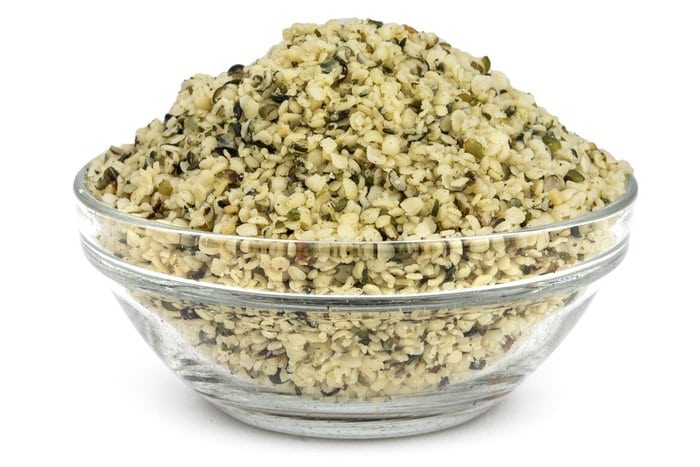
Table of Contents
Hemp Makes it Super!
The hemp plant has so much to offer. Hemp seeds are a superfood providing protein and other vital nutrients like magnesium, fiber, zinc, and iron. The leaves and flowers of the hemp plant produce cannabidiol, a key component of Broad Spectrum Hemp Extract.
With a rich, nutty taste and amazing versatility, these amazing little seeds can be an important part of any meal! Each serving of Hemp Hearts offers 10g of plant protein, 12g of Omegas 3 & 6, all 9 essential amino acids. Manitoba Harvest takes only the freshest, highest quality hemp seeds from field to table.
These are only a few of the reasons why we’ve chosen to add this highly beneficial ingredient to our most popular Keto Breakfast Smoothie as part of the 21-Day Cleanse and 30-Day Maintain via the 90-Day Balance program!
The Hemp Crop
Hemp is an amazing crop. It’s versatile, roots deep, grows tall, and has a broad leaf that helps to naturally suppress weeds without the need for pesticides or herbicides. We take pride in the relationship we’ve built with growers. Our farmers plant non-GMO certified hemp seed in the Spring and harvest it in the Fall.

Sustainable
Hemp is a naturally sustainable crop – it uses less water than traditional crops, produces higher yields in smaller spaces, and is extremely resilient to pests and diseases.

Versatile
In addition to food, there are thousands of uses for hemp’s seed, oil, and fiber – from textiles like rope and clothing, to construction material, bioplastics, fuel, and more.

Nutritious
Compared with chia and flax seeds, hemp seeds provide double the amount of protein, more Omegas 3 & 6, and only half of the carbohydrates per serving.
Hemp Helps the Planet
Every decision we make, action we take, and interaction we create is influenced by how it will impact the community and environment around us. Our standards center on a triple-bottom-line approach: people, planet, and profits. Embracing this mission, we’re proud to be a Certified B Corporation.
The History of Hemp
Humans have had a relationship with hemp for millennia. Dive deep into some significant milestones in the cultivation and regulation of hemp and Manitoba Harvest’s role in shaping its future.
It’s hard to think of another plant that has played such a versatile and multifaceted role in human history. Hemp cultivation stretches back to the very dawn of human civilization, providing one of our earliest sources of textiles and paper, not to mention medicine, food and building materials.
Ancient Civilization
Circa 8,000 BC: Hemp becomes one of the first cultivated agricultural crops. Villagers in ancient Mesopotamia use hemp cord in their pottery. Throughout the next few thousand years, hemp seeds and oil are consumed as food in ancient China, and hemp is used to make textiles throughout China and modern-day Turkestan.
Circa 1,200 BC: Hemp reaches Europe and spreads across the ancient world.
150 BC: The world’s first paper is invented in China, made entirely from hemp.
23 – 70 AD: The medicinal properties of the cannabis plant are noted in early medical texts like The Natural History and Pharmacopoeia.
Early History
1492: Christopher Columbus voyages to the shores of North America on ships hung with hemp sails and rigging.
1533: King Henry VIII of England mandates that all farmers grow industrial hemp or face fines.
1606: French botanist Louis Herbert plants the first hemp crop in North America in modern-day Nova Scotia.
1600s: The first British colony at Jamestown is established. Colonists are required to grow hemp to send to England. George Washington, Thomas Jefferson, and John Adams all grew hemp.
1776: Declaration of Independence is drafted on hemp paper.
1800: The King of England offers free land (and free hemp seed) to immigrants who move to Canada and grow hemp. As in the US, hemp becomes an essential crop for new immigrants for both textile production and as a food.
Modern History
1937: Hemp is strictly regulated by the Marijuana Tax Act, largely due to confusion with other kinds of cannabis. Hemp can only be grown through specifically issued government tax stamps, making any type of possession/transfer without a tax stamp illegal.
1938: Published only a few months after the passing of the Marijuana Tax Act, Popular Mechanics declare hemp as the next billion-dollar crop, estimating over 25,000 different uses for the plant.
1942: The US Department of Agriculture launches a Hemp for Victory campaign to get patriotic farmers to grow hemp in support of war efforts. Between 1942 and 1945, the US cultivates 400,000 acres of hemp.
1957: After World War II , demand for hemp decreases, and hemp production with it. The last commercial hemp fields are planted in 1957 in Wisconsin.
Recent History - Legalization
1970: The Comprehensive Drug Abuse Prevention and Control Act goes into effect, abolishing the taxation approach of the Marijuana Tax Act. This effectively makes all cultivation of cannabis illegal by setting a zero tolerance for THC.
1990: Manitoba Harvest co-founder Martin Moravcik, while a university student in Canada, starts advocacy efforts, helping to form the Manitoba Hemp Alliance. The group goes on to secure a government grant to source hemp seed and commence hemp trials. These trials are a huge success, proving that their hemp crops have undetectable amounts of THC (less than 0.003% THC). Also in this advocacy group are fellow Manitoba Harvest co-founders Alex Chwaiewsky and Mike Fata.
1998: After years of organized advocacy work, industrial hemp is legalized in Canada and a hemp industry is born! This same year, Manitoba Harvest Hemp Foods is founded by former Manitoba Harvest president Mike Fata along with fellow co-founders Alex Chwaiewsky and Martin Moravcik.
2001: The US Drug Enforcement Administration (DEA) launches a campaign to make sales of all hemp products illegal. The hemp industry fights back, and in 2004 the 9th US court of appeals issues a permanent ruling blocking DEA regulations.
2011: Consumers accept hemp, and it shows: in 2011 the number of seeded hemp acres in Canada reaches 38,828, from just 3,781 acres a decade prior.
Hemp's Bright Future
2014: President Barack Obama signs the 2014 Farm Bill, which defines industrial hemp as distinct from cannabis, permitting US research institutions to start piloting hemp farming for research purposes.
2018: Expanding on the success of President Obama’s earlier Farm Bill, President Donald Trump signs the 2018 Farm Bill, which once again federally legalizes hemp production in the United States.
The passing of the 2018 Farm Bill and federal legalization of hemp not only marks an important day in US history, but an important day in Manitoba Harvest history. It is a significant step in increasing access to all the unique and powerful benefits of hemp. Manitoba Harvest is proud to be a hemp company that works with the FDA to pave the way for hemp’s bright future.
Hemp Today
The Agriculture Improvement Act of 2018, known as the 2018 Farm Bill, descheduled the industrial hemp plant from the Controlled Substances Act, federally legalizing hemp production in the United States for the first time. Going above and beyond the 2018 Farm Bill guidance, Manitoba Harvest received Food and Drug Administration clearance as Generally Recognized as Safe (GRAS). This was a historic first for the hemp industry, as we were the only company to proactively gather and provide the scientific evidence necessary to affirm the FDA’s designation of GRAS Notified for our hemp hearts, hemp seed oil, and protein powder.
Manitoba Harvest’s achievement represented an opportunity to broaden consumer access to the nutritional benefits of hemp seeds with the highest possible quality standards. There’s still more work to be done to share the transformative power of hemp with the world, and Manitoba Harvest is proud to lead the charge.